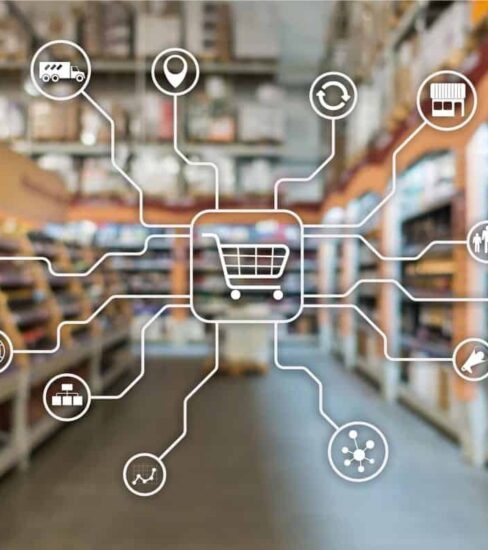Retail business has suffered since the beginning of 2020, with many shutting shops due to reduced sales and frequent lockdowns.
In 2024 retailers are beginning to count on technology to come to their aid. ERP-based retail management software can help retail businesses become more agile and scalable and help them handle their day-to-day operations efficiently.
This article looks at how an ERP-based retail management system can help you grow your business in 2024 despite all odds.
The need for a unified commerce platform
A SalesForce survey revealed that 62% of participants felt that their experiences with one industry influenced their expectations of others. In other words, if someone is used to a seamless pickup and drop service using the Uber app, they may also expect a similarly frictionless retail shopping experience.
Retail owners have much to catch up with, and a unified commerce platform helps. It ensures that all your client data and experiences are stored on a single platform, available for use when needed. Consequently, you can help your customers feel a sense of predictability and a smooth shopping experience in an unstable market environment.
Priority's ERP-based retail management system offers an advanced unified commerce platform. It ensures that all your customers' interactions and behaviors are recorded on a single system and intelligently uses data to help deliver customers with a truly omnichannel experience.
Flexible working schedules
More than 3 million people work in the UK retail sector, and many millions worldwide. For most of these workers, flexible working hours are the second most crucial criterion to remain employed with a retail business. The first critical measure, not surprisingly, is being able to work closer to home. If your employees are unhappy, you can rest assured that your customers won't be either.
With flexible working becoming the norm worldwide, your retail management system should be ready for these changes. In other words, your retail management system should support mobile devices used by sales assistants, easily share documents with different departments, conduct video conferencing, and collate data streams.
Priority's ERP-based retail management system is built for a more flexible future. It allows your employees to work remotely and answer product questions, sort out billing issues, process orders, and returns, and even offer customer service from the comfort of their homes. A Retail management system that is in line with your staff's preferred working style will help you maintain a positive company culture.
Sales on the go
Several retail companies make sales outside their store environment. This could be at trade shows, exhibitions, or customers' residences and offices. Thus, a retail management system should provide point-of-sale solutions that allow employees to process sales on the go.
In addition, the retail management system should also provide retailers with the tools to check stock counts and manage accounts outside the brick-and-mortar branches. It is essential to choose a cloud-based retail management system so that all transactions, online, offline, in-store, or at a pop-up location, are synchronized in real-time to a central database.
Priority's unified retail management system helps retailers unite commerce channels outside the store. Your employees can easily track customers and daily sales and generate reports that need to be sent back to the office.
Self-service Kiosks
A recent study revealed that 49.4% of retail customers preferred using self-service kiosks because they are quicker.
In 2024, self-service checkouts will serve two purposes: avoiding overcrowding at cash counters and maintaining safe physical distance between customers. Moreover, 66% of customers prefer self-service kiosks over employee interactions because it is quicker and less stressful.
Priority ERP-based retail management system provides retailers with a cloud-enabled Self Service Kiosks pos system that helps turbocharge in-store sales, reduce labor costs, and eliminate store overcrowding.
Customer Loyalty management
Many businesses are looking up to CRM and loyalty programs as a way to beat inflation. 55.9% of companies hope to bank on their loyal customers for continued sales. In addition, 67.7% actively consider investing more in customer retention to beat the inflation crisis.
In 2024, retailers' business strategy must focus on retaining existing customers. A comprehensive customer loyalty solution can help businesses onboard customers from any channel and manage various loyalty assets.
Priority's retail management system offers an advanced gift card management software engine that helps retailers easily implement digital, online, and in-store promotions. In addition, Priority's customer loyalty management platform is specifically designed to help retailers retain customers and entice new ones to become loyal.
Centralized retail management console
In 2024, the retail sector is expected to grow at 4.8%, which is half the rate of 2021. The outlook is even more dismal in 2025, with the growth rate expected to hover around 4.1%. In addition, 62% of retailers feel they need better supply chain visibility. Otherwise, getting goods to customers in time can prove to be a challenging task.
Ensuring customer satisfaction seems complicated with disruptions to the supply chain and logistics. A possible solution to this problem is implementing a centralized retail management console.
Priority's ERP-based, unified retail management system offers retailers a clear picture of their entire supply chain and real-time visibility of their retail operations. It provides realistic time estimates despite possible logistics setbacks, thus, enhancing customer trust in your brand.
Simplifying complex retail workflows
A Business process management module helps automate and streamline business processes, invariably reducing operational costs. So far, BPM has been used by IT departments in large organizations to maintain and manage workflows.
In 2024, we expect a shift toward the democratization of BPM. Smaller businesses can access efficient workflow management thanks to technological advancements and cloud-enabled BPM products. Most importantly, we also expect cloud-based BPM to enhance corporate collaboration and drive the automation of various processes.
Priority's BPM module is integrated with its Retail ERP and helps you automate complex retail workflows. You can improve procedural efficiency and enhance transparency. In short, it helps improve communication across departments and offsets delays due to logistical issues.
Cloud-based SaaS model
Cloud based ERP is essential for the future of retail business management. With rising costs and a looming recession, businesses have less money to spare on expensive IT infrastructure. However, they will need help managing their employees remotely, implementing flexible working schedules, and managing retail operations.
A cloud-based SaaS model is the right option for smaller retail units that cannot afford to deploy large-scale ERP products. However, with access to the right software tools, retail units can manage their sales workflows efficiently.
Priority's ERP-based retail management system has all the features that a retail business needs. You can conveniently add or remove modules and manage your retail business without spending on expensive IT infrastructure.
Flexible order fulfillment
Multi-channel order management is essential for a retail business' survival in 2024. Customers may interact with a product online, at your brick-and-mortar store, or even on social media. Regardless of where they encounter your product, they expect flexibility in order fulfillment.
Customers may check out products on your website and choose to pick them up at your store. On the contrary, they may visit your store and order online to use discounts. In short, customers expect to pick up from where they left off and have the convenience of purchasing products the way they want. This is only possible with the help of multi-channel order management and flexible order fulfillment.
Priority's Retail management system helps you to actively listen to what customers want and adopt a collaborative approach based on business intelligence. This enables you to fulfill orders in a manner that satisfies your customers. In times of logistical issues and delayed order fulfillment, this will give you a competitive edge over your peers.
Payment processing in offline/disconnected mode
Many regions often face energy shortages due to weather conditions or infrastructure failure. Unfortunately, disruptions to energy supply mean your POS device may not work as expected.
You may need help connecting to the internet, and checkouts may happen differently than expected. It is essential to choose a Retail management system that allows you to operate your points of sale offline, even when not connected to a power source.
Priority's ERP processes payments in offline and disconnected modes, making it the tool of choice during these energy crises. Whether you have access to the internet and electricity, you will still be able to process payments, register sales, and witness a growth in your revenue.
Future-proof your business with Priority's Unified retail management system
Priority's Unified retail management software offers a comprehensive solution for retailers looking to thrive in an unstable business environment.
Contact us to learn more about how Priority's Retail ERP can help your business grow in 2024 and beyond.


